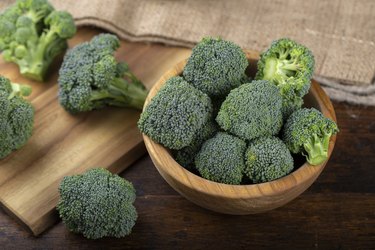
Broccoli contains varying amounts of bitter compounds depending on the type. Standard broccoli is relatively mild in flavor, while Chinese broccoli is slightly more bitter, and broccoli rabe contains the highest level of bitter compounds.
Blanching broccoli in a large pot of salt water releases bitter acids from the plant cells and rinses them away, an action that steaming doesn't provide because of the low level of water involved. Additional measures for neutralizing broccoli's bitterness include tossing it with salt and citrus sauce.
Video of the Day
Video of the Day
Related Reading
Things You'll Need
1 bunch broccoli
5-quart stockpot
Colander
Salt
Blanching and Steaming Broccoli
- Cut the broccoli bunch in half.
- Continue cutting each half into smaller halves until the florets are reduced to bite-size pieces.
- Remove and peel the stem.
- Cut the stems into bite-size oblong pieces.
- Boil 3 quarts of salted water in a stockpot.
- Add the broccoli and submerge for 2 minutes.
- Pour the broccoli into a colander to drain.
- Add an inch of water to the stockpot.
- Boil and place broccoli in a steamer basket over the water. Steam until tender — about 4 minutes.
- Strain the broccoli and sprinkle salt to taste.
Things You'll Need
Juice from 1 orange
1 tsp. orange zest
1 inch ginger, finely minced
1 tbsp. tamari
1 tbsp. honey
1 tbsp. sesame oil
Large bowl
Serving dish
Orange Ginger Sauce
- Combine orange juice, orange zest, ginger, tamari, honey and sesame oil in a large bowl.
- Toss the broccoli with the orange ginger sauce.
- Pour the broccoli into a dish and serve.